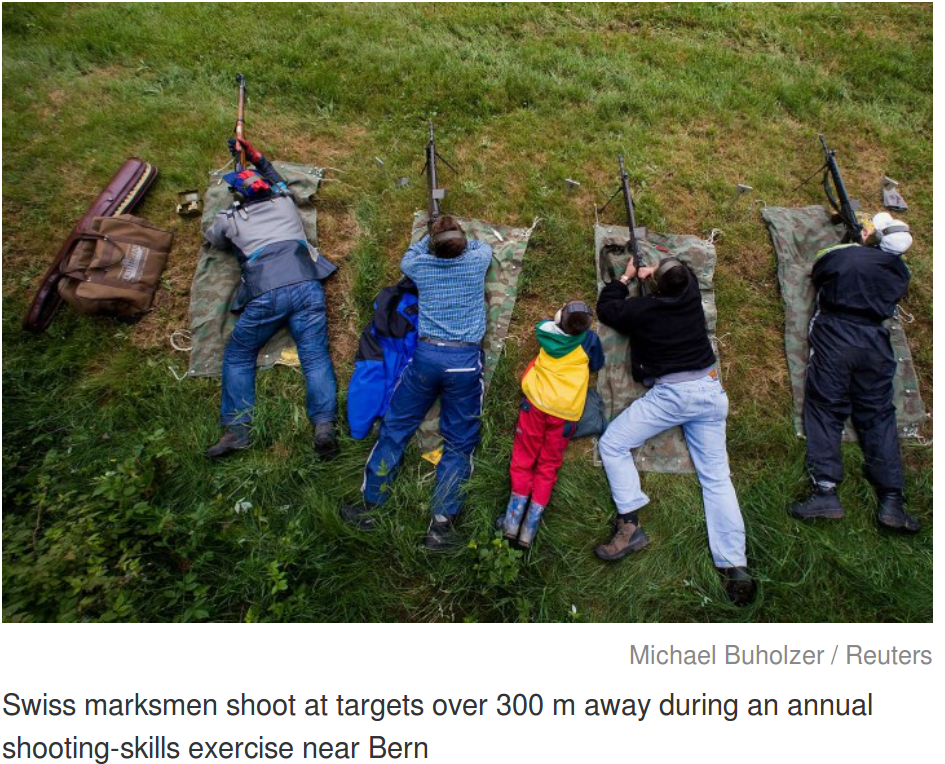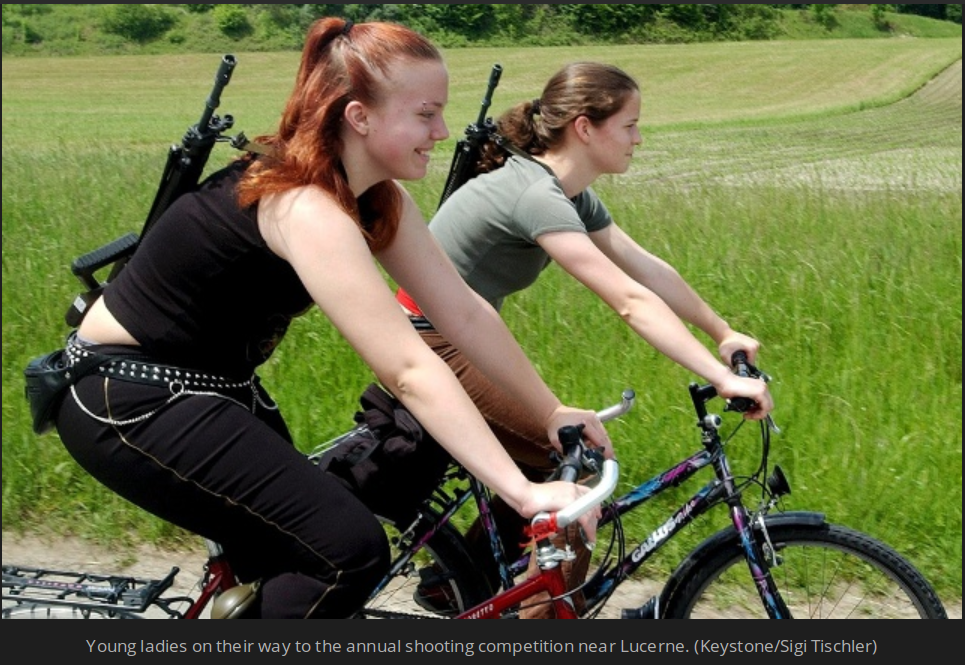
This is an optional reading
for the students in my CSC 301 Computers and Society class. It is a
follow up on comments by one of the students when world homicide rates, as an illustration to psychological projection, were discussed.
On Homicide Rates and Swiss Gun Culture
by Dr. Marek A. Suchenek
September 29, 2015
Copyright and all rights reserved.
This article is posted here for in-class educational use only. No other use or uses is/are allowed.
Among the countries with highest homicide rates are our neighbors: El Salvador, Honduras, and Jamaica. All three of them had rates above 50 homicides per 100,000 people in 2008 (roughly five times the wold average and roughly 10 times the US homicide rate).
None of them had any "internal war" that year, so war atrocities could not be blamed on those exorbitant homicide rates.
See Wikipedia entry for a list of conflicts in Central America:
List of conflicts in Central America
https://en.wikipedia.org/wiki/List_of_conflicts_in_Central_America
The mentioned above high homicide rates are results of relatively large number of violent individuals who reside in those countries. Unfortunately, many of them move to other countries, including the US, and continue their violent behavior there, thus driving up homicide rates in their host countries (including the US and Mexico). Their very presence makes the world a dangerous place to live.
It is true that all three of them, as well as many other high homicide rates countries of the world, are poorly developed, so that a correlation between lagging behind in development and high homicide rates does seem to exist. However, a claim that those high homicide rates are caused by the said poor development is an instance of false cause fallacy (illustrated with the following invalid inferences:
Napoleon Bonaparte became the Emperor of France because he was short.
or
People develop diabetes because they stash insulin at home.)
The false cause fallacy is often used in order to dismiss or marginalize inconvenient facts, just like in the case of Switzerland's low homicide rate in the circumstances of high gun ownership rate in that country (the former being, ostensibly, a result of restrictions on ammo possession and storage), and extremely high homicide rates in many undeveloped countries (as if a lack of industry was the cause of violent behavior).
Here is an excerpt form an article that explains that fallacy.
Correlation does not imply causation
https://en.wikipedia.org/wiki/Correlation_does_not_imply_causation
A plausible explanation of the above correlation is that the societies with relatively large number of violent criminals seem unable to sustain (never mind create) well-functioning economies.
There is an abundance of data (present and historic) that support such
a causation. Thus the mentioned above causality claim is an instance of
confusion of the cause and effect, just like in the diabetes-insulin fallacy.
Switzerland, on the other hand, has one of the lowest homicide rates in the world, despite of that country high saturation with individually-owned firearms and its gun culture.
The Swiss Difference: A Gun Culture That Works
http://world.time.com/2012/12/20/
the-swiss-difference-a-gun-culture-that-works/
cache
http://cc.bingj.com/cache.aspx?q=%22since+2008%2c+
all+military+%E2%80%94+but+not+private+%E2%80%94+
ammunition+must+be+stored+in+central+arsenals%22&d=
4806675436995688&mkt=en-US&setlang=en-US&w=
-ABlI5z9iJGJ0tdpB1v3LAQk2gLNFpaw

"Even
though Switzerland has not been involved in an armed conflict since a
standoff between Catholics and Protestants in 1847, the Swiss are very
serious not only about their right to own weapons but also to carry
them around in public. Because of this general acceptance and even
pride in gun ownership, nobody bats an eye at the sight of a civilian
riding a bus, bike or motorcycle to the shooting range, with a rifle
slung across the shoulder.
"Unlike some other heavily armed nations, Switzerland’s gun ownership
is deeply rooted in a sense of patriotic duty and national identity.
Weapons are kept at home because of the long-held belief that enemies
could invade tiny Switzerland quickly, so every soldier had to be able
to fight his way to his regiment’s assembly point.
"But the “gun in every closet” tradition was challenged in 2001, after
a disgruntled citizen opened fire with his army rifle inside a regional
parliament, killing 14 and injuring 14 others — the only mass shooting
in Switzerland’s recent history. The subsequent opposition to
widespread gun ownership spearheaded a push for stricter arms
legislation.
"The authorities made one concession, though: since [December 12,] 2008, all military — but not private — ammunition must be stored in central arsenals rather than in soldiers’ homes.
A claim (made in class) that Switzerland minuscule homicide rate is a result of ammunition being allegedly kept away from the individual gun owners is false. Although a legislation was passed that mandated ammunitions to be kept in arsenals only, that legislation pertained only to ammunitions owned by the military, and not to privately owned ammunition. So, the individuals can buy and keep their ammo together with their guns.
Also, the said legislation was effective beginning December 12, 2008, so it could not be the cause of the low homicide rate of 0.71 per 100,000 people in year 2008.
Thus
a claim that Switzerland has low homicide rate because of restrictions
on possession and storage of ammunition is based on a fallacy, just like in the short Napoleon fallacy.
There is no scientific evidence that would support such a claim, and a
lot of scientific evidence that invalidates it. It is a false claim
that has became part of anti-gun propaganda in the U.S. and elsewhere.

Do you expect the two ladies above to start killing innocent humans from their assault riffles? (I don't.)
Interestingly, some groups (in Switzerland and elsewhere) that for political reasons are hostile to the very idea of armed citizenry were calling for ban on private ownership of guns in Switzerland in order to curb ... gun violence.
Gun vote "was about national identity"
http://www.swissinfo.ch/eng/gun-vote--was-about-national-identity-/29488450
In
Switzerland, a license is required to posses a pistol or revolver (no
license is needed for a rifle or shotgun). However, it is easy for a
law-abiding and sane adult do purchase a rifle or semi-automatic pistol.
Here are the requirements:
Acquiring a firearm
https://www.ch.ch/en/acquiring-firearm/
Firearms acquisition permit
To obtain a permit:
you must be at least 18 years old,
you must not be subject to a deputyship or a supervision order,
you must not give any cause to assume that you could harm yourself or anyone else with the weapon,
you must not have a criminal record for violent or dangerous offences or repeated felonies or misdemeanours.
More reading ...
Firearms-Control Legislation and Policy: Switzerland
http://www.loc.gov/law/help/firearms-control/switzerland.php